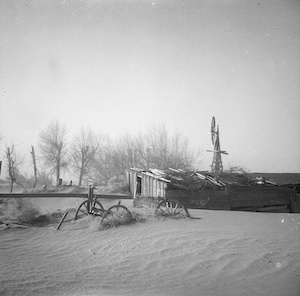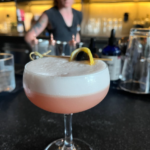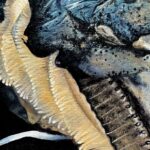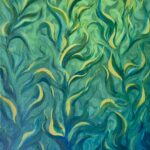By Robert Mendonsa
a novella (excerpt)
1
Prowers County, Colorado. 1934.
Elsie watched as the figure ambled through a field of uprooted sod and cornhusks that fanned out from behind the family’s ragged barn. She was seated on a small spindle-legged chair by her bedroom window. Behind her, she felt the walls of her bedroom seethe from the day’s residual heat; it was a summery thickness that ate away at the shadowed edges of the room.
For the last three weeks, Elsie had gotten used to sitting in that smog-dark air—with her forehead glistening and her gaze aimed longingly into the Coloradan horizon. Tonight, it would be no different. But tonight maybe the figure in the field would be—
The hair on her bare and pale and dust-speckled arms (soiled all the way up to the shoulder straps of her baggy flour-sack dress) stood on end. Elsie finally felt that her mother would come home soon and tell her what to do once the storm hit. She could taste the very static of her mother’s thoughts in the air—it was a mix of copper, ash, sagebrush.
Elsie stood from the chair and walked over to the side of an iron bed frame. She was careful not to let the floorboards betray her weight. She knelt over the sagging mattress, bringing her elbows to a slow rest over a stiff and stained fold of quilt. The skin of her knees—also covered in sod, purpled with dark bruises—brushed over a small towel she had laid over the hardwood a short time ago. She wasn’t surprised to find that it was already blackened and abrasive with dirt. It was how things were whenever a storm had come and gone, how it would probably be after years had gone by (assuming all wasn’t buried by then).
Elsie brought her hands together over her forehead, and her cracked lips began to move soundlessly, at first, before her prayer rose above the silence.
“Oh, God: my refuge and strength. In this place of unrelenting light and noise, enfold me in your holy darkness and silence,” Elsie whispered. “Let me rest secure under the shadow of your wings—Amen.”
Down the hall, Uncle Jeremiah’s snores echoed throughout the silent farmhouse like a dull ache. Elsie made peace with the fact that, soon, Uncle Jeremiah would probably awaken, and the ache would be gone from the house. By then it would be only the yowl of wind and the dust that grated through the walls—which could shield her uncle’s steps whenever it pleased him. Such thoughts gave Elsie the feeling that someone was lightly tracing the length of her spine with a fingernail.
Her hands tightened.
Elsie whispered the prayer again, this time with her forehead pressed into her palms. She thought of something her father told her when things got hard when she was younger: Just be right with your mother, and everything will be all right, Elsie-Hawk. You’ll see. That’s when she felt a warmth settle over the back of her shoulders—her mother’s shadowed form whispering into her ear, telling her to go to the window.
Elsie lifted her head and stood in the darkening room, alone. Ashen rivers ran from the edges of her eyes and streaked down to her chin, where they fell in blotches over the quilt. She knew that it would later turn to mud if she let it sit, which was much harder to scrub out than pure dust, but she would save such worries for another phase of the moon; instead, she tried to put on her bestest and warmest smile for Mama, who had finally come home. Elsie turned toward the window.
From it came a great sheath of granular darkness.
#
Back in 1928, Elsie’s family had lived farther east, in Boulder, Colorado. Her parents had been renting a small craftsman bungalow in University Hill. It was cramped, but that was all right: it was just the three of them anyway, and from her bedroom window Elsie could see Flagstaff Mountain ascending from the eastern foothills of the Rockies. Her family hadn’t been living there long, at the time, and it was one of the most beautiful places Elsie had ever seen in her then six years of life; such formations of rock had been unknown to her (and she later presumed for her mother and father, as well) as a native from the great flatlands farther southeast.
Samuel Starling, Elsie’s father, had recently taken a job as an adjunct professor of Agricultural Studies at the local university. Delores Starling, Elsie’s mother, kept the books a few days a week for Mr. Walsh down at the courthouse, and helped out part time as a seamstress at the milliner’s downtown. Her mother was always busy, sure, but Elsie had a feeling Mama would lose her marbles if she ever ran out of things to do with her hands. Daddy said it was because Mama was used to the farm life.
“I’m telling you, Dolores,” Samuel said one morning, “these farmhands—they just don’t want to listen to me.”
Samuel was a handsome fellow with moss-green eyes and glistening dark hair—both of which Elsie had unduly inherited, instead of her mother’s blue eyes and reddish-blond hair. He was sitting at their small, circular kitchen table reading Boulder’s only publication, the Daily Camera. His free hand gripped a fresh cup of dark coffee. Dolores was situated by the kitchen counter kneading dough with her hands. Elsie sat across from her father and stared absently at the one fried egg left on her plate.
“Well, you just need to give them time to understand, is all,” Dolores said. “They’ll come around.”
“But that’s exactly my point; we don’t have much time to begin with, and these dry spells—whether they believe it or not—are going to make what they’re doing that much harder on ‘em. What they’re doing to the ground: it’s unsustainable.”
“Samuel, you must be patient with them. Like my own mother always used to say: ‘Hot tempers cause arguments, but patience brings peace.’”
“Hot—” Elsie cut in, “—Tempers?” She said this with her best imitation of the adult-tone frequently used by her mother. Elsie looked up and made eye contact with her father.
He smirked and gave her a wink, and she gave him a wink back just before her gaze returned to her plate. Her eyes widened. In one fell swoop, her fork (which, to her disappointment, she saw was just a fork and not a set of talons) scooped the egg and dropped it into her mouth. She chewed noisily with wide eyes, imagining she was a hawk devouring a field mouse. But not an actual field mouse, because that’d be gross. Unless it was made from buttered eggs; then that’d be alright, she thought.
“It’s not that simple,” Samuel said, his focus returning to his wife. “You’ve never seen the way these folks look at me. It’s like they think I’m there to undermine them with authority. But, in truth, it’s just a warning. If what I think will happen happens, no matter where we come from, we’ll all be in deep shi—”
Elsie-Hawk and Samuel locked gazes again. Dolores looked furiously over her shoulder at Samuel, and his posture shifted backwards as though he felt heat coming directly from his wife’s eyes.
“Shiitake,” he finished.
Dolores looked downward at the dough spread over the wooden countertop. After a brief pause, she said, “Blesséd, Samuel. You best watch that tongue of yours before it turns silver and the Devil thinks of you as kin.”
Samuel’s neck visibly strained for a moment. Then he smiled and put a single finger over his mouth as if to say: We’ll keep this to ourselves, Elsie-Hawk.
“Daddy, what’s ‘shiitake’?” Elsie asked.
“Well…it’s a Japanese wood mushroom cultivated from oak logs—
Dolores cleared her throat.
“That—well, they’re used in both medicinal and culinary ways. Once, my faculty advisor shared a mycological journal—
Dolores cleared her throat again.
“—they sometimes dry them or serve them in broth…well, it’s like a vegetable, Elsie-Hawk. You’ve seen mushrooms on trees before, just don’t eat any without askin—”
Dolores cleared her throat much louder this time. Samuel’s eyes narrowed toward his wife’s back, and he grew quiet. Elsie thought, Gosh. I hope Mama doesn’t choke on whatever she’s chewing; it sounds awful big.
After taking the time to consider what her father said in the newfound silence, Elsie’s eyes widened.
“Oh. Oh! OoOooh! And we wouldn’t want that!”
“Huh?” Samuel said, coming out of his daze.
“Vegetables! We wouldn’t want to be deep in vegetables!” Elsie shouted. She burst from the chair and spread her gaunt arms outward as if they were wings. She flapped them, forcefully, and unleashed a primal squawk: “Because vegetables are not meat, and hawks eat meat!”
Elsie squawked again, this time louder, and imagined herself sailing the open skies with great big hawk wings. In reality, she was clumsily circling the small kitchen table, making what sounded like a strange gurgling cough. Samuel started to bellow with laughter, with both hands pressed against the midsection of his shirt. Dolores, meanwhile, tried to stop herself from smiling.
Dolores settled for looking downward so her daughter and husband could not see it form on her face. It was a grand smile—bright and shining. She attempted to stop a giggle from escaping her throat; but just like that, her own laughter converged with her husband’s in the family’s tiny kitchen. Elsie began to laugh, too—although she wasn’t quite sure exactly what they were all laughing at. But Elsie didn’t really care why because it felt good.
It felt better, Elsie imagined, than being knee-deep in shiitake.
#
Later that same evening, just before he left, Samuel asked Elsie if she could see him at the door. Elsie’s mother was in the family study (which Daddy usually referred to as “the closet”) working on what her Mama always called “the books” (Daddy said this was a vague term that meant “boring old people stuff”).
Earlier that day, Samuel had mentioned that he and his colleagues were driving sixty miles east, the farthest they would have gone for one of his recent lectures. There, they were to meet with a local commune of farmers to present on the condition of the sod spread over the eastern prairielands.
Daddy said things were getting bad with the soil, and before long the Great Plains would see the consequences—if they didn’t revise their farming methods soon, that was. Elsie didn’t really know what any of this meant, but she shook her head all the same because whenever Daddy spoke about dirt, he got real excited and red around the cheeks. She just gave him her biggest smile and nodded whenever he stopped to look her in the eyes.
“You and your mother won’t see me for two days, you hear?” he said. “My colleagues and I are being put up at a boarding house tonight and tomorrow night, courtesy of the state. We have to drive farther southeast the next few days to give these lectures to a few other communities farther south. You be good for your mother, all right?” Elsie nodded. “I’ll be back before you know it.”
Samuel grabbed his hat from the coatrack and placed it over his chest. Elsie stood in front of the door, facing her father. He smiled down at her, and she smiled back. Then a frown formed over Elsie’s brow. Samuel put a hand on her shoulder and smiled again.
“Daddy?” she mumbled.
“Yes, my Baby Bird?”
“I’m real sorry about Mama, lately. I don’t know why she’s sometimes mean to you—but I’m sure she doesn’t really mean it, you know? Not always.”
Samuel looked into the hall, which narrowed darkly toward the closed door of the study. He crouched down and placed the hat over his head and looked straight into Elsie’s eyes. Both his hands—which were nearly double the size of Elsie’s head, yet light and soft to touch—came to rest, gently, over Elsie’s shoulders. Each of his sun-brightened eyes mirrored her emeraldine own.
“That’s okay. Your mother has had a lot on her mind lately, and sometimes it’s difficult to not lash out whenever that happens,” he whispered. “And you’re right, or at least I think you’re right—she doesn’t really mean it, okay? She’s been through a lot the last few weeks. And that makes it fine just the same, as long as she works things out in here.” Samuel took his right hand off of Elsie’s shoulder and placed it, with a closed fist, right over his heart. “Just be right with your mother, and everything will be alright, Elsie-Hawk. You’ll see.”
Elsie nodded, looking toward the study door.
“Was it Uncle Jeremiah’s letter?” Elsie asked. “About Grandpa and Gramma Ward?”
Samuel considered this.
“That would be just what’s on your mother’s mind, I’m sure,” Samuel finally said, nodding. “She didn’t take it too well, like anyone in her position would; she hadn’t seen them for, well—she had left the Ward family farm on their bad side. My fault, likely. You’re still probably too young to understand.” Samuel looked as if he were talking more to himself than his daughter. Elsie nodded absently.
“I wish I had a chance to meet them: Grandpa and Gramma Ward. It would’ve been real nice to see what grandparents are like.” Elsie paused for a time. “Do you think Mama misses her home? Do you think maybe she should go back and see it again? Maybe it’d make her—I don’t know—feel better. And I could meet Uncle Jeremiah!”
Samuel’s eyes grew dark as he cast a glance back into the hall. He looked at the hardwood glooming under the arc of the waning light. It felt strange to Elsie because at that moment, he didn’t look like her father at all but like a stranger. His mouth moved as though he meant to speak, but no sound came out.
They were both startled when a 1927 Ford Model T sitting in the driveway blared its horn. Elsie’s father stood up, and he moved to retrieve a small, dark suitcase lying by the kitchen table. He tried to smile at Elsie again, but there was something weak about it—something frail, like a flaw in a mirror that’s so small it’s barely noticeable, but noticeable all the same.
“I’ve got to run, Elspeth Ward Starling,” he said. “I’ll see you in another time, another place. Keep your mother close, now.”
“Bye, Daddy.”
#
Elsie gave her father one last hug before he left, and just like that—in a mere matter of fragments eluding the construct of time itself, or so it felt in Elsie’s memory—he was gone from the house. Elsie wandered outside and sat on a nearby hill as the Ford drove off, her elfin form shielded by a cool stretch of shade underneath a cluster of cottonwoods. Far away and over the distant black strip of road encased by vales of jagged rock and undergrowth, the Ford Model T lurched eastward while dark fumes frothed from its tailpipe. Elsie began to whisper a song so old she could barely remember its name, or even where she had heard it before.
“I skipped over the water…I danced over the sea…and all the birds in the air…couldn’t catch me…”
From over the distant hillside, a cluster of steel-blue rain clouds rolled above the evergreen glens. Soon, rain would slant indifferently into the earth—no matter what sat beneath it.






